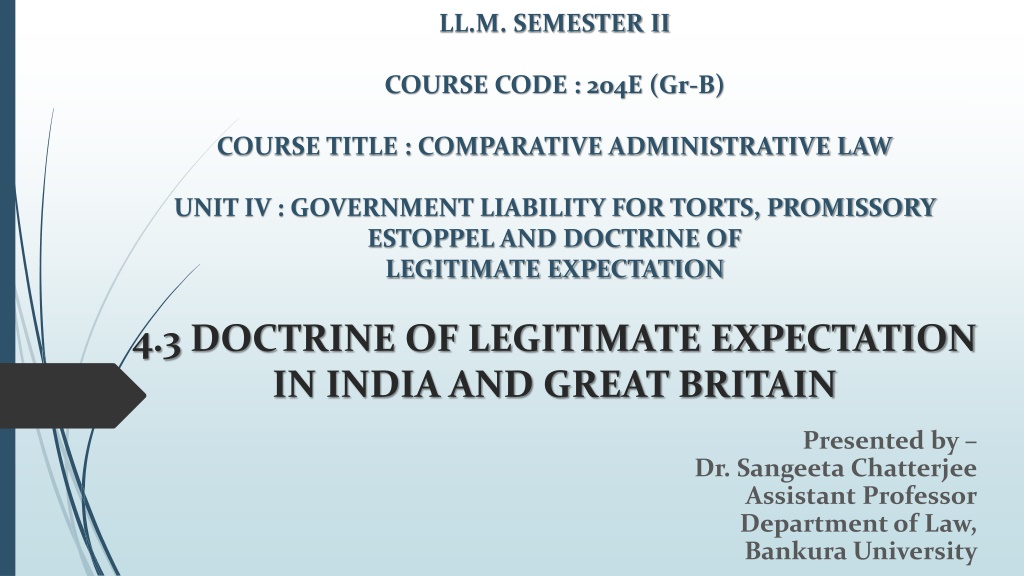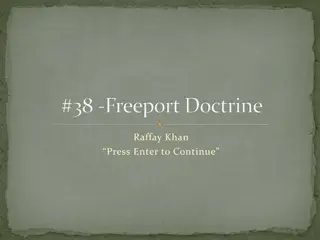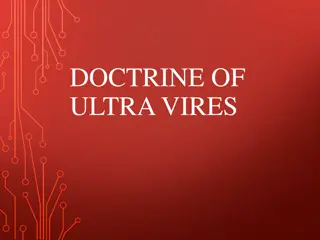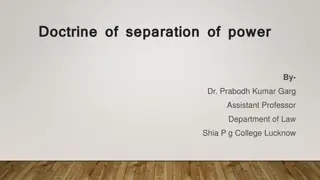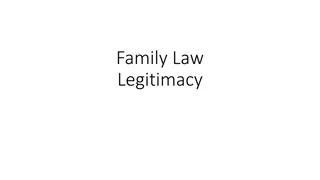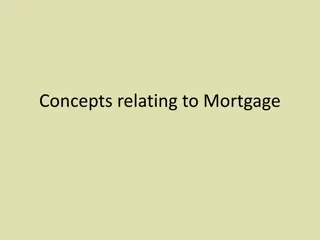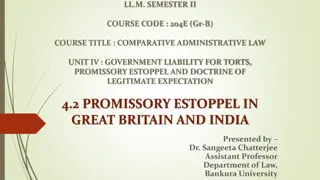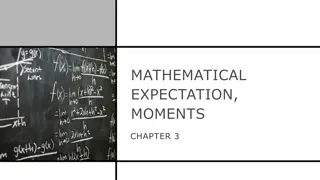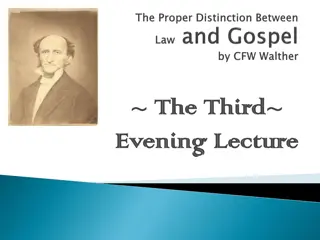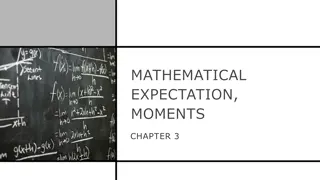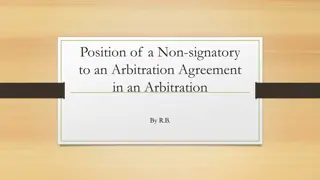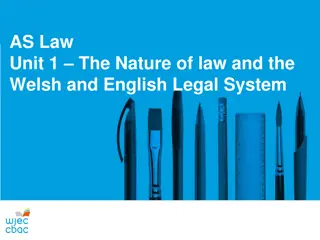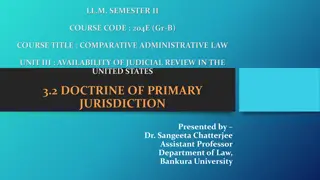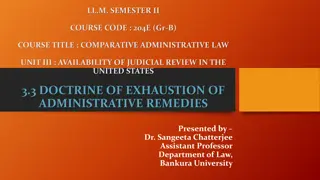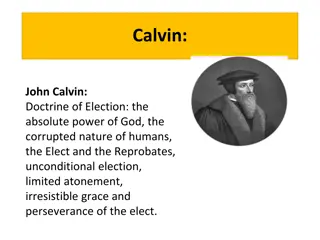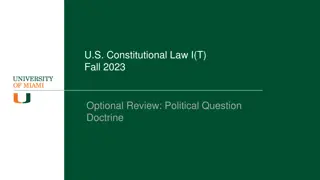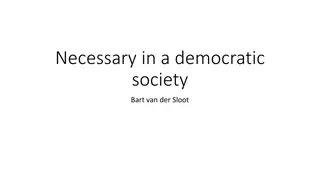Doctrine of Legitimate Expectation in Public Law
The doctrine of Legitimate Expectation provides relief to individuals when their legitimate expectations are violated. Originating in the UK, it has become significant in various common law jurisdictions. This doctrine allows individuals to seek redress when administrative authorities act arbitrarily, ensuring fair treatment based on past practices or promises made by the authority.
Download Presentation

Please find below an Image/Link to download the presentation.
The content on the website is provided AS IS for your information and personal use only. It may not be sold, licensed, or shared on other websites without obtaining consent from the author.If you encounter any issues during the download, it is possible that the publisher has removed the file from their server.
You are allowed to download the files provided on this website for personal or commercial use, subject to the condition that they are used lawfully. All files are the property of their respective owners.
The content on the website is provided AS IS for your information and personal use only. It may not be sold, licensed, or shared on other websites without obtaining consent from the author.
E N D
Presentation Transcript
LL.M. SEMESTER II COURSE CODE : 204E (Gr-B) COURSE TITLE : COMPARATIVE ADMINISTRATIVE LAW UNIT IV : GOVERNMENT LIABILITY FOR TORTS, PROMISSORY ESTOPPEL AND DOCTRINE OF LEGITIMATE EXPECTATION 4.3 DOCTRINE OF LEGITIMATE EXPECTATION IN INDIA AND GREAT BRITAIN Presented by Dr. Sangeeta Chatterjee Assistant Professor Department of Law, Bankura University
INTRODUCTION The doctrine of Legitimate Expectation belongs to the domain of public law. It is intended to give relief to the people when they are notable to justify theirclaims on the basis of law. In the strict sense of the term, though they have suffered a civil consequence because their legitimate expectation had been violated. It is something between a right and no right . It is different from anticipation, desire and hope.
BACKDROP The Doctrine of Legitimate Expectation originated in United Kingdom and later on followed in various other common law jurisdictions. The term legitimate expectation was first used by Lord Denning in 1969. From that time it has assumed the position of a significant doctrine of public law in almostall jurisdictions. The concept of legitimate expectation first stepped into the English Law in Schmidt v. Secretary, of State for Home Affairs, 1969, wherein Lord Denning observed that an alien who had been given leave to enter the United Kingdom for a limited period had a legitimate expectation of being allowed to stay for the permitted time and if that permission was revoked before the time expires, that alien ought to be given an opportunityof making representations.
DOCTRINE OF LEGITIMATE EXPECTATION Halsbury s Laws of England explains the "doctrine of legitimate expectation in the following words: Legitimate expectations: A person may have a legitimate expectation of being treated in a certain way by an administrative authority even though he has no legal right in private law to receive such treatment. The expectation may arise either from a representation or promise made by the authority, including an implied representation, or from consistent past practice. The existence of a legitimate expectation may have a number of different consequences; it may give locus standi to seek leave to apply for judicial review ; it may mean that the authority ought not to act so as to defeat the expectation without some overriding reason of public policy to justify its doing so; or it may mean that, if the authority proposes to defeat a person's legitimate expectations, it must afford him an opportunity to make representation on the matter. The courts also distinguish, for example in licensing cases, between original applications, to renew and revocations; a party who has been granted a licence may have legitimate expectation that it will be renewed unless there is some good reason not to do so, and may therefore be entitled to greater procedural protection than a mereapplicant foragrant." [Source: Halsbury s Laws of England, Fourth Edition, Volume 1(1) p. 151]
EXPLANATION In India, the Supreme Court has developed this doctrine in order to check the arbitrary exercise of power by the administrativeauthorities. In private law, a person can approach the court only when his right based on statute orcontract is violated. But this rule of locus standi is relaxed in public law to allow standing even when a legitimate expectation from a public authority is not fulfilled. Therefore, this doctrine provides a central space between no claim and a legal claim , wherein public authority can be made accountable on the ground of an expectation which is legitimate.
EXAMPLE For example, if the government has made a scheme for providing drinking water in villages in certain area but later on changed it, so as to exclude certain villages from the purview of the scheme, then in such a case, what is violated is the legitimate expectation of the people in the excluded villages for tap water, and the government can be held responsible, if the exclusion is not fairand reasonable. Thus, this doctrine becomes a part of the principles of natural justice, and no one can be deprived of his legitimate expectation principles of natural justice. without following the
CATEGORIES 1. Whether it was necessary for the public authority to bear in mind its previous policy? Here the court will be confined to determine the rationality of the decision. 2. When the court considers that promise or practice of such authority induced legitimate expectation the court will, by itself presume that right to be heard is there, until overriding public interest is established by said authority. 3. When the court considers that a lawful promise or practice has induced a legitimate expectation of a benefit which is substantive, not simply procedural, authority now establishes that here too the court will in a proper case decide whether to frustrate the expectation is so unfair that to take a new and different course will amount to an abuse of power. Here, once the legitimacy of the expectation is established, the court will have the task of weighing the requirements of fairness against any overriding interest relied upon for thechange of policy.
GROUNDS OF REFUSAL Overriding Public Interest Change in Statutory Law Ultra Vires Legislative Instruments Doctrine of Balancing
POSITION IN GREAT BRITAIN In Breen v. Amalgamated Engg. Union, 1971, the doctrine of legitimate expectation found its legitimate place in England. In that case, the court held that, if a person claims a privilege, he can be turned away without hearing, but here a person has something more than a mere privilege a legitimate expectation that his election would be approved unless there are relevant reasons for not doing so, therefore, the natural justice principles are attracted to the case in order to ensure fairness. Evolving the doctrine further, courts in England, support the opinion that the claim of legitimate expectation must not always fail against legal incapacity. Therefore, on the grounds of equity, recourse to legitimate expectation can be taken even when the expectation is based on representation which is beyond the powers of authority.
POSITION IN INDIA The doctrine of legitimate expectation is an example of judicial creativity and not an extra legal or extra- constitutional. In India, it is found within the four corners of Article 14 of the Constitution. It prevents arbitrariness and insists on fairness in all administrativedealings. The first reference to the doctrine is found in State of Kerala v. K.G. Madhavan Pillai, 1988. In Jitendra Kumar v. State of Haryana, 2008, the court held that, legitimate expectation gives sufficient locus standi to the applicant for judicial review.
RELATION WITH PROMISSORY ESTOPPEL The doctrine of legitimate expectation shares space with the principle of promissory estoppel. If the principle of promissory would apply, there may not be any reason as to why the doctrine of legitimate expectation would not apply. However, this doctrine cannot be applied in the face of exerciseof legislative power.
CRITICISM It operates in public domain and in appropriate cases, constitutes a substantive and enforceable right. The principle at the root of the doctrine is the rule of law which requires regularity, predictability and certainty in governments dealing with the public. An exception could be based on an express promise, or representation, or policy, or by an established past action orsettled conductwhich is illegal.
CONCLUSION The doctrine has been evolved to ensure regularity, predictability and certainty in government dealing with the public and thus, shares space with the doctrine of public trust . It is now considered to be a part of the principles of natural justice. Therefore, if by reason of the existing state of affairs, a party is given to understand that the other party shall not take away the benefit without complying with the principles of natural justice, the doctrine of legitimate applicable. expectation shall be
REFERENCE : 1. Dr. I. P. Massey, Administrative Law, Eastern Book Company, Lucknow, 8thEdition, 2012. 2. Qaisar Abbas, Doctrine of Legitimate Expectations: Prospects and Problems in Pakistan, Pakistan Law Journal, 2008, http://ssrn.com/abstract=2609639, visited on 02.06.2020.
